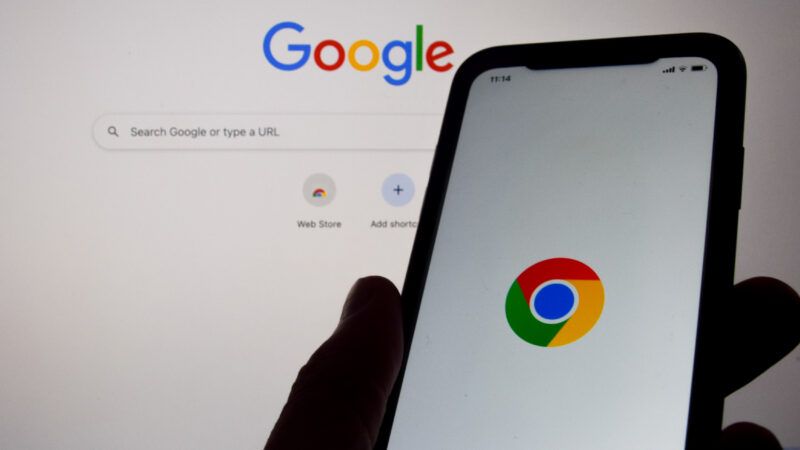Forcing Google To Sell Chrome and Android Won't Make its Search Engine Less Popular
The Department of Justice's recommended remedies will only harm consumers.

The Department of Justice (DOJ) is trying to force Google to sell Chrome after a federal judge ruled that the tech giant had monopolized the search market. Making Google divest itself from Chrome and Android won't significantly reduce Google's share of the market for general search services, it will just harm consumers.
The DOJ's antitrust crusade against the tech giant began in October 2020 when, invoking Section 2 of the Sherman Act, it argued that Google had abused its monopoly power to "require preinstallation and prominent placement of Google's apps," among other claims of exclusionary conduct. Judge Amit P. Mehta of the U.S. District Court for the District of Columbia ruled in favor of the DOJ in August, finding Google guilty of monopolizing the general search engine (GSE) market.
To end Google's monopoly over the GSE market, the DOJ recommended divestiture from Chrome, "which has 'fortified [Google's] dominance,'" and Android, "which would prevent Google from using Android to exclude rival search providers."
Ryan Young, senior economist at the Competitive Enterprise Institute, tells Reason that the DOJ's narrow market definition doesn't consider Reddit, ChatGPT, and other GSE alternatives, which "have become popular, and in some areas outperform Google."
Even accepting the DOJ's definition of the GSE market, the claim that Chrome is responsible for Google's dominance of the market is highly dubious. Google made up 89 percent of the U.S. search engine market despite Chrome making up only 57 percent of the U.S. browser market as of October 2024. That means at least 74 percent of non-Chrome users search with Google, even assuming 100 percent of Chrome users search with Google.
Even if Chrome suddenly vanished, it's clear Google would still dominate the GSE market. Nevertheless, antitrust enforcers insist Chrome is "a key access point through which many people use [Google's] search engine," reports Bloomberg. If Chrome is a key access point to Google, so are Safari, Firefox, and Edge.
The DOJ also recommends Google be barred from using "its ownership and control of Android, or any other Google product or service, to: degrade…the features, functionality, or user experience, on rival GSE, Search Text Ads, or AI Products on Android Devices." But divesting Google from Android would deprive users of the convenience of bundling smartphones with the suite of preinstalled Google apps, including Chrome, Google Play, Google Maps, Google Drive, and the rest of the comprehensive suite of free-to-use apps.
This isn't the only lawsuit the DOJ has against Google. The DOJ sued the embattled tech firm in January 2023 for violating the Sherman Antitrust Act by monopolizing digital advertising technology. The DOJ claims Google's acquisitions of ad tech competitors "have had harmful effects on competition and consumers." But that's not quite true.
The expectation of acquisition benefits consumers by encouraging R&D investment in a manner similar to advance market commitments that guarantee firms a prespecified return for a product. If the latter benefits consumers by encouraging innovation, so does the former.
Consumer welfare is the end goal of competition just as "consumption is the sole end and purpose of all production," according to Adam Smith. Google's integration of its search engine, suite of apps, browser, and Android phones has made consumers' lives better; the DOJ's recommendations will make them worse.


Show Comments (17)